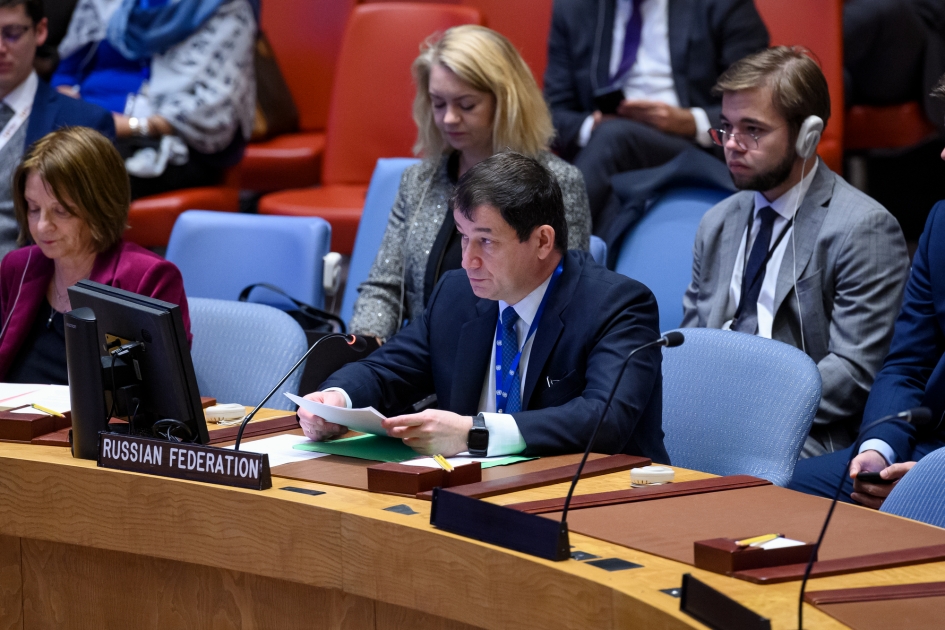Statement by First Deputy Permanent Representative Dmitry Polyanskiy at UNSC briefing on the situation in Libya
Mr.President,
We thank Special Representative of the Secretary-General and Head of the UN Support Mission in Libya Abdoulaye Bathily for his briefing on the situation in Libya.
At the outset, let me congratulate you, SRSG Bathily, on your appointment to this major post. For almost a year, UNSMIL was compelled to operate without a UNSC-authorized leader, which rebounded on the Libyan settlement process, and not in the positive way. We do count on you to boost your mediator efforts soon and engage with the Libyan sides in the interests of resetting the political process. On our part, we reiterate our support for the UN efforts in Libya, aimed at searching for practical ways to resolve the crisis, and intend to provide all possible assistance.
So far the domestic situation in Libya raises concern. If the de facto duality of power persists, it will lead to nothing but further destabilization. Clashes between armed groups that recur more frequently now, mobilization activity, and mass demonstrations by the population clearly indicate this. The main task of the Security Council at this point is to not let outbreaks of violence transform into a civil war. Attempts to “freeze” the internal political conflict in Libya that are made in the absence of real steps towards settlement and national reconciliation are very shortsighted.
One of the possible ways to resolve the current Libyan impasse is endorsement of draft Constitution and convening of nation-wide inclusive elections. We note certain progress at the political track. At the meeting in Moscow on 21 October, speaker of the Libyan House of Representatives A.Saleh and Chairman of the High Council of State K.al-Mishri agreed to finalize unification of executive authorities and make senior appointments until the beginning of 2023. We do hope that the sides will continue addressing problems via adoption of confidence-building measures and compromise solutions. We underscore that any artificial deadlines will only create extra impediments.
Inclusiveness is the cornerstone of national reconciliation in Libya, meaning that this process should involve all leading political forces, including representatives of the former authorities. In this context, we welcome the efforts of the African Union to organize a Libya-wide national reconciliation conference.
No less important is cooperation at the security track. We share the call of the Special Representative about the need to resume contacts of chiefs of general staffs of Libya’s east and west in order to ensure unification of Libyan military bodies. Our position as to cancellation of foreign military presence in Libya remains unchanged – we stand for a synchronized, well-balanced, systematic and step-by-step withdrawal of all non-Libyan armed groups and military units.
Mr.President,
In order for the Libyan political process to be successful, all international and regional stakeholders need to coordinate their efforts and look for comprehensive ways to “untangle the Libyan knot” in the interests of the Libyan people rather than someone's own egoistic purposes. Attempts to manipulate the Libyan sides and influence the situation on the ground unilaterally will not solve the problem of duality of power in the country, but will rather deepen the divide. We see no added value in attempts to create separate mechanisms for Libyan settlement, in which Libya would have no role to play (as is usually the case). We need to listen to the opinion of the Libyans how have stated consistently that thoughtless external interference never promotes the cause of unification of the country, and only impedes the political process.
Mr.President,
We still proceed from the central role of the United Nations and UNSMIL as the critical factors in coordinating international mediator efforts in Libya. Hopefully, Libya’s leading political forces are ready for targeted and constructive interaction with these mechanisms. Thereby the “first fiddle” in coordinating future state arrangements for the country is to be played by the Libyans themselves.
On 31 October, UNSMIL’s mandate is going to expire. Previously we insisted on its three-month technical rollover – due to the unacceptable situation around the Mission’s senior positions. Now the situation has changed for the better, so we are ready to consider its 12-month renewal and discuss specific content of a relevant UNSC resolution.
Colleagues,
Before I conclude, let me remind everyone of a very sad anniversary that we are having. 11 years ago, on 20 October 2011, former head of the Libyan Arab Jamahiriya Muammar Gaddafi was brutally murdered in the vicinity of the city of Sirte. Now we all realize that forceful actions of Western states plunged Libya into a state of chaos and lawlessness. Libyans still have not been able to overcome completely the devastating effects of that tragedy. We all need to learn our lessons and help Libya embark on a path towards lasting and strong peace, which we sincerely wish for our Libyan friends.
Thank you.
